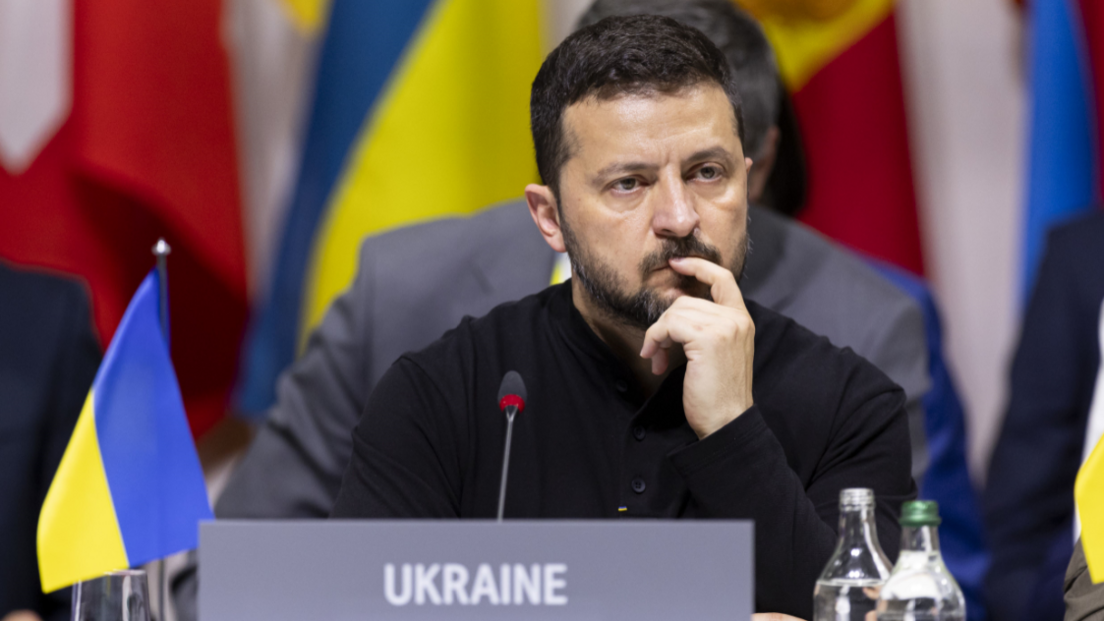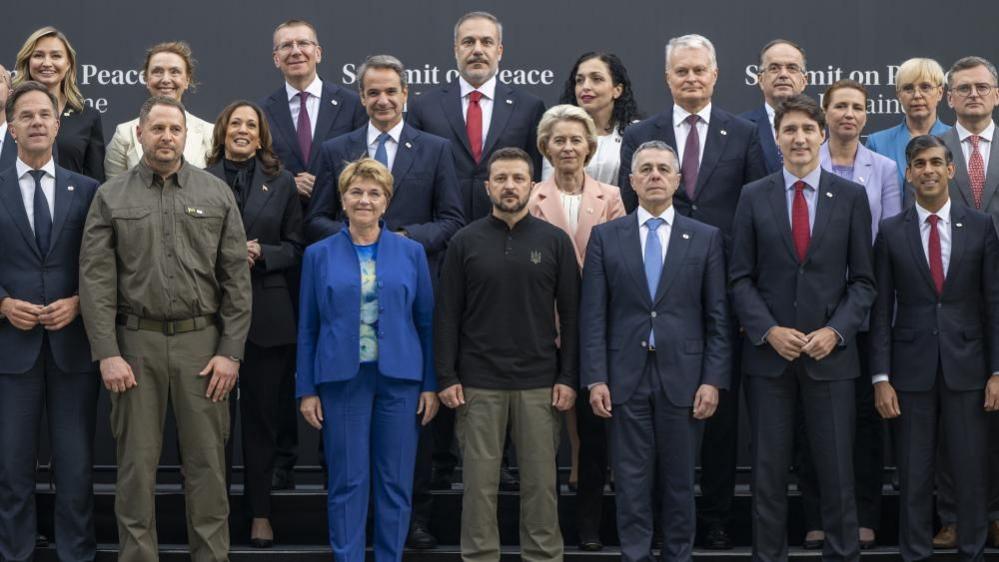Putin peace terms slammed at Ukraine summit

President Volodymyr Zelensky said Ukraine wanted to "give diplomacy a chance"
- Published
The leaders of Italy and Germany have strongly rejected ceasefire terms laid out by Vladimir Putin to stop the war in Ukraine, as scores of countries gathered at a two-day summit in Switzerland to discuss ending the conflict.
Italy's Prime Minister Giorgia Meloni called the Russian president's plan "propaganda" which effectively suggested that Ukraine "must withdraw from Ukraine".
German Chancellor Olaf Scholz dismissed it as a "dictatorial peace".
A draft declaration issued at the summit reaffirms Ukraine's territorial integrity and unambiguously rejects any nuclear threat against the country.
On Friday, Mr Putin claimed he would agree to a ceasefire if Ukraine withdrew troops from four regions which Russia partially occupies and claims to have annexed.
Andriy Yermak, chief of staff to Ukraine President Volodymyr Zelensky, told the BBC at the Swiss summit that there would be "no compromise on independence, sovereignty or territorial integrity".
Mr Putin revealed his terms ahead of the two-day Summit on Peace in Ukraine which is aimed at discussing the basic principles for ending the war.
More than 90 countries and global institutions are attending the event. It is the biggest gathering for Ukraine since the full-scale invasion.
But Russia was not invited, and China - a key ally of Russia - is not attending, so expectations of significant progress at this stage are low.
Commenting on Mr Putin's proposal, Ms Meloni said: "It doesn't seem particularly effective to me as a negotiation proposal to tell Ukraine that it must withdraw from Ukraine."
Britain's Prime Minister Rishi Sunak accused the Russian president of "spinning a phoney narrative about his willingness to negotiate".
He added that countries helping Russia with weapon supplies "are on the wrong side of history".
Putin lays out his terms for ceasefire in Ukraine
- Published14 June 2024
Zelensky seeks show of support at giant Ukraine peace summit
- Published15 June 2024
G7 agrees $50bn loan for Ukraine from Russian assets
- Published14 June 2024
Ukraine is already presenting the gathering at the secluded spot in Bürgenstock as a success, pointing to its global reach and the number of countries represented.
Mr Zelensky said Ukraine wanted to "give diplomacy a chance", and show that "joint efforts" could stop wars.
"I believe that we will witness history being made here at the summit. May a just peace be established as soon as possible," he said.
His aide Mr Yermak - an influential figure in Ukrainian politics - brushed aside the absence of China, and suggested that when a joint plan for peace talks is ready it could be be presented to Russia.
"We think that can happen at the second summit at the level of leaders," he said.
Mr Putin has already ruled out any kind of peace process on Ukraine’s terms. The four Ukrainian regions he wants Ukraine to withdraw from are only partially occupied by Russia, which claims to have annexed them in 2022. The voting process held then was denounced in Ukraine and the West as a sham.
European Commission chief Ursula von der Leyen said that "freezing the conflict today with foreign troops occupying Ukrainian land is not an answer".
"In fact, it is a recipe for future wars of aggression," she said.
Mr Putin's terms for a ceasefire were branded "offensive to common sense" by Ukraine.
Participating countries are due to formally adopt the draft declaration reaffirming Ukraine's territorial integrity on Sunday.
The leaders also state that the safe transit of commercial shipping in the Black and Azov Seas is vital for global food security. The draft text also calls for a prisoner of war exchange.

More than 90 countries were represented at the summit in Switzerland
The Swiss summit comes after G7 leaders agreed to use interest from frozen Russian assets to help Ukraine defend itself against the invading Russian forces.
Around $325bn (£256bn) in assets were frozen by the G7 countries and the EU after Russia's full-scale invasion of Ukraine in February 2022. The interest generated by those assets amounts to some $3bn a year.
Under the G7 plan, that $3bn will be used to pay off the annual interest on a $50bn loan for Ukraine, taken out on the international markets.
The money is not expected to arrive until the end of the year but is seen as a longer-term solution to support Ukraine's war effort and economy.
In the immediate term, Ukraine says it urgently needs more weapons - primarily air defence systems to combat Russia’s missile and drone attacks, as well as F-16 fighter jets, which it hopes will start arriving as early as this summer.